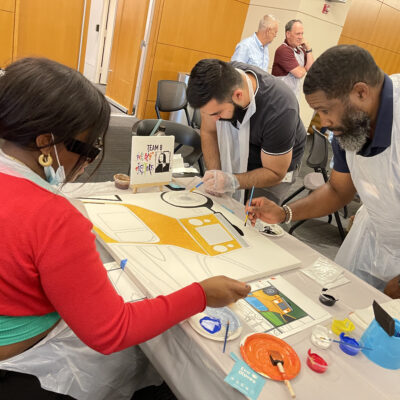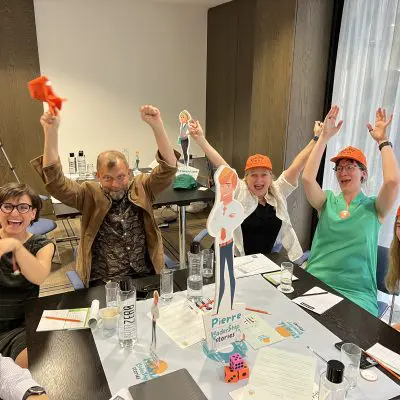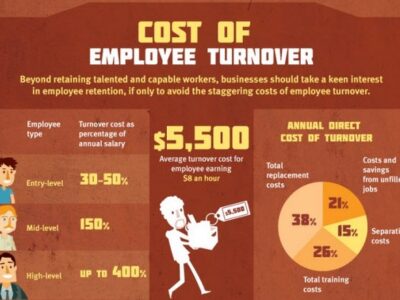Trust lays the foundation for everything else in the workplace. But unfortunately, only 21% of U.S. workers strongly agree that they trust the leadership of their organization.
This is concerning, seeing as a team that trusts their leadership will be more comfortable, cohesive, and confident, resulting in more success. They will communicate more effectively and ultimately be better employees. Building trust in the workplace is essential if you want to be as successful as possible.
In this article, we’ll break down the basics of trust in the workplace, why it matters, and what you can do to create a culture of trust in the workplace.
Why is Trust Important in the Workplace?
Before we jump into team building and trust activities, let’s recap why building trust in the workplace is so important for the success of your business.
Trusting Employees are More Loyal
Just like any relationship, trust and loyalty are nonnegotiable for a healthy dynamic. If employees don’t completely trust you and your business practices, they’re likely not going to fully commit to the company in fear of being let go, taken advantage of, or underestimated. Trusting employees, however, are willing to go the extra mile and stay loyal to the company because they know their best interests are at the heart of the company.
Trust Creates Future Leaders
Similarly to how trust creates more loyal employees, it also empowers employees to seek out growth opportunities in order to succeed within the company. Rather than looking elsewhere for better employment opportunities, trusting employees will aim to become a leader within their current team.
Building Trust Boosts Engagement
By fostering open communication and creating a positive work culture, building trust in the workplace significantly boosts employee engagement. When employees have trust in leadership, they’re more likely to voice ideas, give feedback, and work together to go above and beyond the company goals. Employees who feel like they can take risks without being punished are more likely to innovate and stay engaged with the company for years to come.
Employee Trust Affects Clients

“In order for our clients to trust our business we have to trust the employees to deliver on the promises that we make. To me it’s important to build trusting relationships with my employees and invest in their success so they treat our business as if it’s their own.”
Customers can tell when your employees are passionate about their work and feel like they’re respected at your company. Make sure you’re building trust in the workplace so employees feel empowered to perform their best and build rapport with clients.
Challenges to Building Trust in the Workplace
Though it’s easy to say you need to build trust, knowing how to build trust in the workplace is a different story. Building trust at work can be difficult, and it’s not something that comes overnight. It can take weeks, months, and sometimes years to build or regain trust. There are many challenges to building trust in the workplace, so let’s take a look at some of the most common ones.
Lack of transparency.
One of the most common obstacles to building trust in the workplace is a lack of transparency, especially from management. When employees don’t know what’s going on, issues start to arise. People wonder why a decision was made, worry about their job security, and get more stressed. These all can have clear negative impacts on the work environment.
Deloitte’s 8-part series, “The Chemistry of Trust,” highlights several companies that recently experienced a negative trust-related event. The results? Each company’s market cap was eroded by 20-56% with losses accounting for a combined $70 billion value.
On the other hand, transparency makes trust much easier to build. When employees feel like they know what’s going on, understand why decisions are made, and clearly understand the company’s actions, it makes it much easier to trust the company and their coworkers. It helps them feel engaged and involved as well, which can have benefits with morale and productivity.
Poor communication.
As with transparency, poor communication is another common obstacle to building trust at work. Clear and consistent communication goes a long way when it comes to trust. When communication breaks down at work, relationships are harder to build and maintain, employees can get confused and stressed, and more.
However, good communication makes all the difference. With communication, managers can build strong relationships with their teams. Employees feel like they are cared about, included, and can communicate their struggles with their coworkers. This makes building trust in the work much easier.
Trust goes both ways.
Something that management in particular often misses in regard to trust is that trust goes both ways. It is not a one way relationship, and it must be earned. Upper management cannot expect to be trusted without putting in the effort to show they trust their employees. They have to lead by example and show that their employees can trust them before they can expect to be trusted.
Management and leaders can start building trust in the workplace by being more transparent and communicate more openly with employees. This shows that you value their input, want them to be involved, and trust them with important information.
You also want to stick to your word as much as possible. If you say you will deal with an issue, promise a raise or bonus, or make some other promise, you need to make sure you follow through. When employees see you put your trust in them, they will do the same.
Lack of Trust and a Toxic Work Environment
Before moving on and focusing on how to build trust in the workplace, let’s briefly talk about how a lack of trust can lead to a toxic work environment.
A lack of trust in the workplace has many negative consequences. As trust deteriorates, people start to feel anxious, stressed, and insecure about their position at work. Unsurprisingly, this can lead to jealousy, unhealthy competition, gossip, rumors, and low morale.
These are all signs of a toxic work environment. A lack of trust quickly breaks down relationships, leading to the hallmarks of a toxic workplace environment. Those environments are inefficient, ineffective, and unenjoyable for everyone involved. If you want your company to achieve your goals, it is essential that you foster an environment of trust and prevent your workplace from becoming toxic.
How to Build Trust in the Workplace
Now that you’re aware of the common obstacles to building trust in the workplace, let’s look at some ways you can build trust at work. Here are a few strategies and tips you can use to build trust.
1. Effective communication and transparency.
This shouldn’t be a surprise since poor communication and a lack of transparency are common obstacles to building trust in the workplace. Communication and transparency go hand in hand, and they are an essential part of building trust.
According to a Lexicon presentation, 80% of Americans say communication is a key factor in building trust at work. Employees clearly feel that communication is an important part of building trust. Employees need to be able to communicate freely with each other and management, and management needs to communicate freely with their teams.
With good communication, transparency comes too. Communicating your decisions, changes, and thought processes makes you more transparent, which also helps build trust with employees. When they feel like they are included and informed of what’s going on, they are going to feel like they are trusted.
2. Practicing active listening.
Being an active listener is a great way to build trust. Active listening goes beyond simply hearing a person’s words and involves being present, trying to understand their meaning and intent, being an active participant in the conversation, and more.
Take the time to focus on developing your active listening skills. Work on things like non-verbal cues, eye contact, asking questions (that aren’t yes or no), being patient, and reflecting on others’ words before you respond.
3. Taking accountability.
Accountability is something that is often overlooked when it comes to building trust in the workplace, but it is incredibly important. Lack of accountability is one of the quickest ways to lose trust, and having a culture of accountability is a great way to develop trust at work.
When employees—particularly management—aren’t held accountable, employees lose trust. They feel like their employer doesn’t care, is making excuses for higher ups, and deepens the divide. When accountability is present though, employees feel like they can trust their leaders to do the right thing and stand up for them.
4. Building personal connections.
Lastly, you need to build personal connections if you want to develop trust. Trust needs a relationship to build upon, so you need to focus on building your personal connections too. Things as simple as asking others about their hobbies, helping people out, and being friendly at work can help build personal connections.
Building personal connections can seem intimidating for many. However, it’s not as bad as it seems, especially if you take advantage of the many resources available to help you build connections, such as trust team building exercises.
5. Inspiring confidence in the future.
According to Gallup, only 18% of employees strongly agree that their leadership keeps them in the loop on why they’re making business decisions. Similarly, only about 20% are highly confident in leaders to manage upcoming challenges. This is concerning because leading change is tough when your team doesn’t understand why you’re making certain decisions for the future.
While employees don’t need your entire plan in detail, they do need to understand why they’re coming into work every day and the steps they must take to achieve company goals. It’s important to highlight successes as they come about to help employees enjoy the path toward future success.
Team Building and Trust Activities
Trust building exercises for work are one of the best ways to build trust. These events and activities can help you build relationships, increase communication, and more importantly, develop trust. Consider using these team building trust activities in the workplace:
- Team Pechakucha.
- Two Truths and a Lie.
- Crescendo.
- Dining in the Dark.
- Customizable virtual training programs.
- Willow in the wind.
- Icebreaker questions.
- Reflect together.
Tips for Leaders to Foster a Culture of Trust
It’s important to note that trust starts with leadership. Leaders have a responsibility to foster a culture of trust in the workplace. If employees don’t feel like their leaders trust them and are trustworthy, there won’t be a greater culture of trust. But if leaders lead by example and set a standard of trust, that will influence the entire company.
Open and honest, constructive feedback is a great starting point. You don’t want to lie to employees and say their work is better or worse than it is, but you also don’t want to be too harsh. Be open and honest about your feelings, and always make sure your feedback is constructive. Give actionable advice and suggestions instead of saying something is bad or could be better.
A safe and supporting environment is also important. Employees should feel like they are safe at work and talk to coworkers or management about issues. Listen to employees’ thoughts and concerns, consider their input, and be an active listener. This will help your teams feel safe and comfortable having open discussions, which will greatly help build trust.
Start Building Trust Today
Trust is an important building block of any successful workplace. With it, your employees will have better morale and be more efficient, and your workplace will be a more positive and welcoming place. Building trust in the workplace can seem like an impossible task, but with effective communication, transparency, strong personal connections, and accountability, you can build trust and teamwork.
Trust and team building go hand in hand, so start building trust today with TeamBonding. We have a wide range of events and programs to help you develop relationships. Contact us today to find a team building program that will help you create a culture of trust.
















